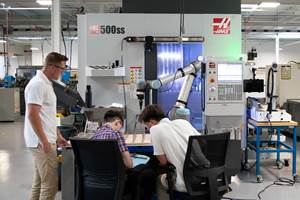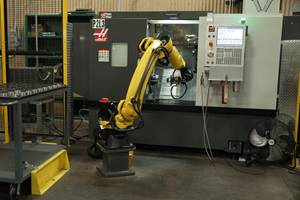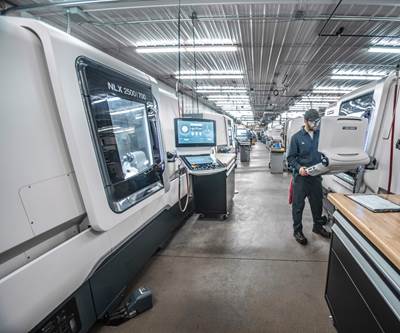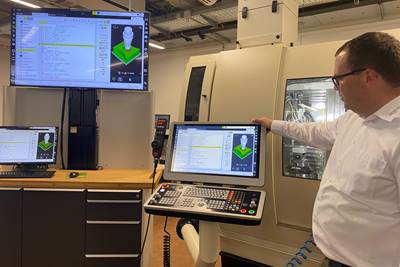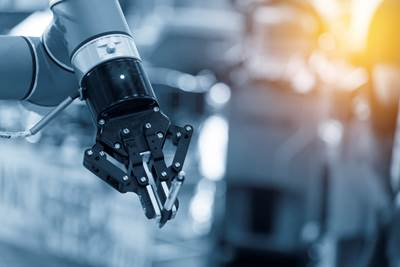Share





DMG MORI held its 2024 Innovation Days event at its Chicago solutions center May 7-10. The theme of the event was “Machining Transformation,” which is also the name of the platform the company announced to help manufacturers address a range of challenges.
From labor shortages and supply chain complexities to an increasing variety of part numbers and environmental concerns, shops today face many challenges, and machining technology suppliers are evolving to meet these challenges. DMG MORI’s annual Innovation Days event, held May 7-10 at its Chicago Solutions Center, served as a showcase for this development. The event’s theme was “Machining Transformation,” which is also what the company calls the framework it developed to answer these challenges. As John McDonald, the company’s VP of technology explained, the technologies on display illustrated the platform’s four pillars of process integration, automation, digital transformation and green transformation.

This part illustrates how hybrid manufacturing (a form of process integration) can be used to repair parts. One feature is worn, one is built up with material using a DED additive manufacturing process and the third feature is machined and fully repaired.
Process Integration
Process integration refers to machine tools that can perform multiple operations within the same platform. This leads to shops needing fewer machines, a change that in turn requires fewer operators, reduces power and coolant usage and simplifies supply chains. Multiple machine tools on display at the event illustrated this concept. DMG MORI’s new INH 63 and 80 HMCs, as well as its line of DMU 40 entry-level VMCs use five-axis machining to help users consolidate machining operations. On the turning side, the new NZ Due, Tre and Quattro turning centers are available with two, three or four milling units. And Lasertec DED hybrid machines support both additive and subtractive processes.

The event also featured automation solutions, including this Robo2Go unit. It can be integrated with a number of DMG MORI machine tools and programmed directly from the machine control for easy programming.
Automation
Automation enables manufacturers to run their machines for longer stretches of time with fewer operators. As McDonald pointed out, shops that aren’t ready to adopt process integration by purchasing a new machine tool can begin their own machining transformation by adding automation to their existing machine tools. Automation had a presence at the event, with one of the new DMU 40’s featuring a Robo2Go. This automation system works with many of DMG MORI’s machines, including both mills and lathes, and features a robotic arm user can program via the machine’s control for easy setup. And the new INH HMCs are designed to use pallets, which can be integrated with the company’s LPP pallet storage system.

The new INH 63 five-axis HMC was one of several machines that debuted at the event. This machine includes digital features including AI chip control and Greenmode, which reduces power consumption.
Digital Transformation
Digital solutions can solve a range of challenges for manufacturers and, like automation, can help shops increase productivity without the full investment in a new machine tool. For example, the INH 63 on display at the event featured AI chip control. Cameras mounted inside the machine enclosure capture images when a machining operation is complete, and AI analyzes the images to determine where the chips are located. Then coolant nozzles are automatically adjusted to remove the chips. DMG MORI partners also showcased digital solutions, including Gemineers, which uses data from the control to simulate a part program and create a digital twin of the part so users can know whether it is good or bad without having to inspect or measure it.
Green Transformation
Process integration, automation and digital transformation all contribute to sustainable manufacturing. Process integration reduces the number of machines (and therefore power output and coolant). Automation can help shops optimize the use of their resources and create more efficient and streamlined processes. And software such as the INH’s Greenmode can monitor and reduce power consumption.
Related Content
CNC Machine Shop Honored for Automation, Machine Monitoring
From cobots to machine monitoring, this Top Shop honoree shows that machining technology is about more than the machine tool.
Read MoreWhich Approach to Automation Fits Your CNC Machine Tool?
Choosing the right automation to pair with a CNC machine tool cell means weighing various factors, as this fabrication business has learned well.
Read MoreInvesting in Automation, Five-Axis to Increase Production Capacity
To meet an increase in demand, this shop invested heavily in automation solutions and five-axis machines to ramp up its production capabilities.
Read More3 Ways Artificial Intelligence Will Revolutionize Machine Shops
AI will become a tool to increase productivity in the same way that robotics has.
Read MoreRead Next
Why Tie Payroll Hours to Machine Tool Hours?
J&R Machine uses machine-monitoring data not just to track machine uptime, but also to create a financial index that helps it shape decisions related to equipment, processes, staffing, sales and business in general.
Read MoreManufacturing Technology and Training in Europe
NTMA’s European Tech Tour exposed attendees to the latest technology and traditional training methods used by European manufacturers.
Read MoreLessons on the Journey Toward Shop Automation
By necessity, small and mid-sized American job shops are automating production, whether through swift, dramatic upgrades in capital equipment, or slow, methodical changes to processes and procedures on the shop floor.
Read More



















.png;maxWidth=300;quality=90)






